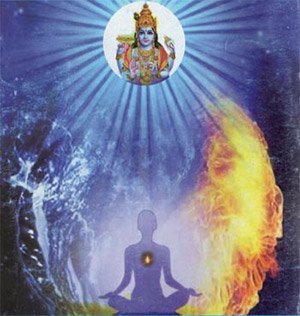Siddhanta Sangraha of Sri Sailacharya
by E. Sowmya Narayanan | 2008 | 30,562 words
Siddhanta Sangraha Chapter 26 (English translation), entitled “self-validity of knowledge” as included in the critical edition and study. The Siddhanta Samgraha is a Sanskrit philosophical text dealing with Vishishtadvaita in five hundred Sanskrit verses. It was written by Shri Shailacarya (18th century) and closely follows the philosophy of Vedanta Deshika (13th century).
Chapter 26 - Self-validity of Knowledge
238. The knowledge is intrinsically valid. The self validity is achieved even at the time of origination itself and hence its validity is not extrinsic. While the sense organ is in contact with the object, the validity of knowledge is simultaneously achieved. Here the prāmānya is pramātva (tadvadviśeṣyakatvam).
239. The knowledge when comprehended as it is is pramā and at the time of comprehension it is self-luminous. This svayamprakaśatva serves as an adjective to pramātva.
240. Here, the word prāmānya is used to denote pramātva. In some occasions the same word is used for pramiti karaṇa. The pramāṇā (the valid means of knowledge) is three fold, namely, pratyakṣa (perception), anumāna (inference), śabda (verbal testimony).
Conclusion:
 This concludes Self-validity of Knowledge according to Vishishtadvaita philosophy explained by Shri Shailacarya. This book follows the model of Vedanta Deshika although the Vishishta Advaita school was originally expounded by Shri Ramanuja. Vishishta-Advaita is one of the various sub-schools of Vedanta which itself represents one of the six orthodox schools of Hindu Philosophy. They highlight the importance of the Upanishads, the Bhagavad Gita and the Brahma Sutras.
This concludes Self-validity of Knowledge according to Vishishtadvaita philosophy explained by Shri Shailacarya. This book follows the model of Vedanta Deshika although the Vishishta Advaita school was originally expounded by Shri Ramanuja. Vishishta-Advaita is one of the various sub-schools of Vedanta which itself represents one of the six orthodox schools of Hindu Philosophy. They highlight the importance of the Upanishads, the Bhagavad Gita and the Brahma Sutras.
